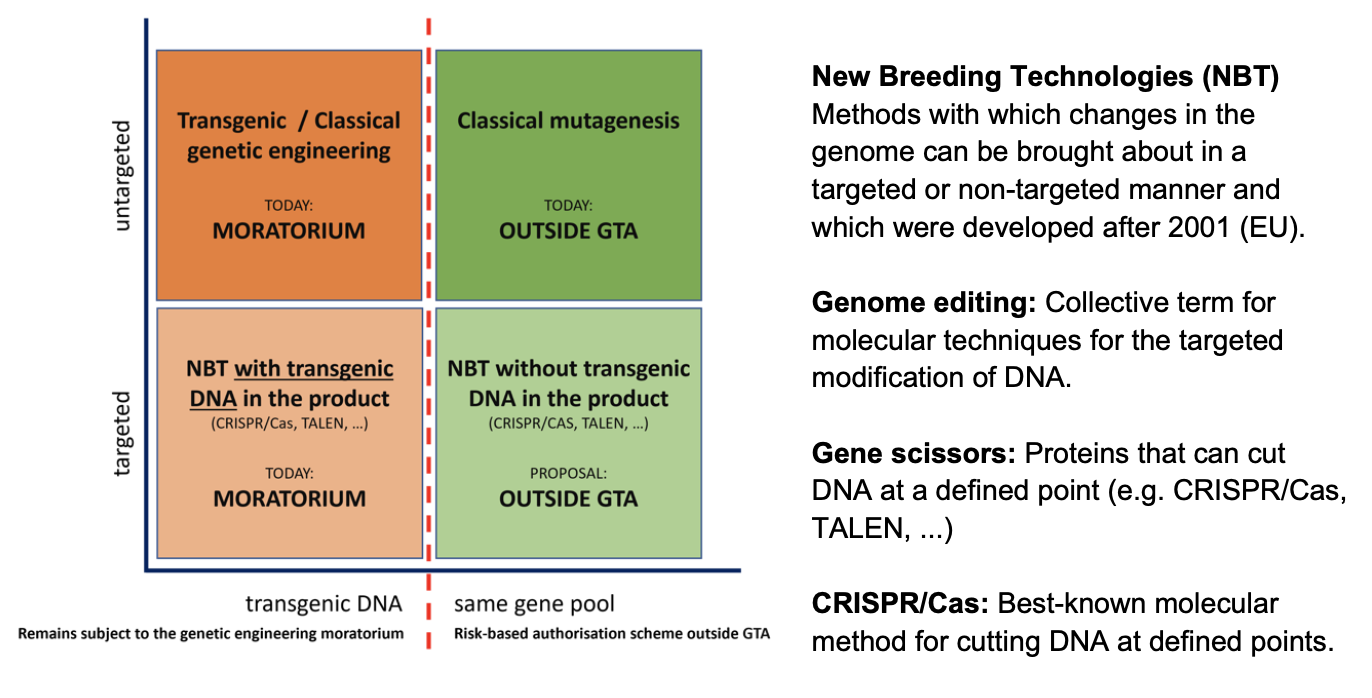
New Breeding Technologies (NBT)
Swiss agriculture is under pressure. Due to the changing climatic conditions and increasing weather extremes, the cultivation of many crops has become more demanding. Nevertheless, consumers, processors and trade expect regional and high-quality products at affordable prices. And farmers have fewer and fewer options to protect their crops efficiently.
Monday, March 21, 2022
The new breeding technologies (NBT) play a central role in this regard. You can make an important contribution to sustainable and productive agriculture in the future. But every further development – even without genetic material beyond the species limit (transgenic DNA) – is (also) blocked today by the genetic engineering moratorium.
Classical mutagenesis has been a proven breeding method for many decades. It causes random changes in a plant's genetic material through radioactive irradiation or the use of chemicals. Their products have no negative effects on humans, animals or the environment and are not considered genetically modified organisms. They are also grown in organic farming. In Switzerland, many varieties are grown on the fields whose properties have been bred through classical mutagenesis. Practically every pasta wheat is based on such mutation breeding.
NBT without transgenic DNA are a gentler and more precise advancement of classical mutagenesis. It is thus possible to make existing varieties more resistant to heat, fungi or pests through targeted, minor changes in the genome. Genes from the same gene pool (cisgene = within the species boundary) can also be transferred with NBT much more efficiently than is possible with conventional breeding. A well-known problem in Switzerland is late blight, for example. Common potato varieties could now be immunized against this fungal disease by NBT with resistance genes from their own gene pool. The same applies to well-known grape varieties that could be made resistant to powdery mildew. A list of ten applications of new breeding technologies for Switzerland can be found on swiss-food.ch. In this way, it is possible to respond to major challenges in cultivation and at the same time reduce the use of pesticides in Switzerland.
The distinction between transgenic DNA and DNA from the same gene pool is widely used for regulation around the world. New breeding technologies without transgenic genetic material have little in common with classic genetic engineering. They trigger changes in the genome (mutation) or introduce species-specific genes. Such changes are also possible through nature or through classical breeding, but more randomly and therefore less frequently.

Sources
Related articles

Biotechnology has only just begun
When Frank Schirrmacher cleared the pages of the Frankfurter Allgemeine Zeitung's arts section on 27 June 2000 to publish the human genome, which had just been deciphered for the first time, letter by letter over six pages, biotechnology came to the attention of the general public for the first time.

Genetic engineering? Yes, of course.
As a consumer, you often don't know: products advertised as GMO-free have long contained genetic engineering. This is a thorn in the side of opponents of genetic engineering. But it is easier to keep quiet about the ‘scandal’ – because something we have been eating for a long time no longer scares us.

Vegan alternatives thanks to genetic engineering
How can we feed a growing global population in a sustainable way? The answer increasingly lies in laboratories and genetic engineering. Whether it's lab-grown milk, vegan squid or farmed salmon – genetic engineering is everywhere. It's high time to dispel the old myths.

Only half the truth in the genetic engineering debate
Those who only see the risks remain blind to the opportunities offered by a new technology. Opponents of genetic engineering have presented a new survey on new breeding methods, which reveals some telling gaps.

